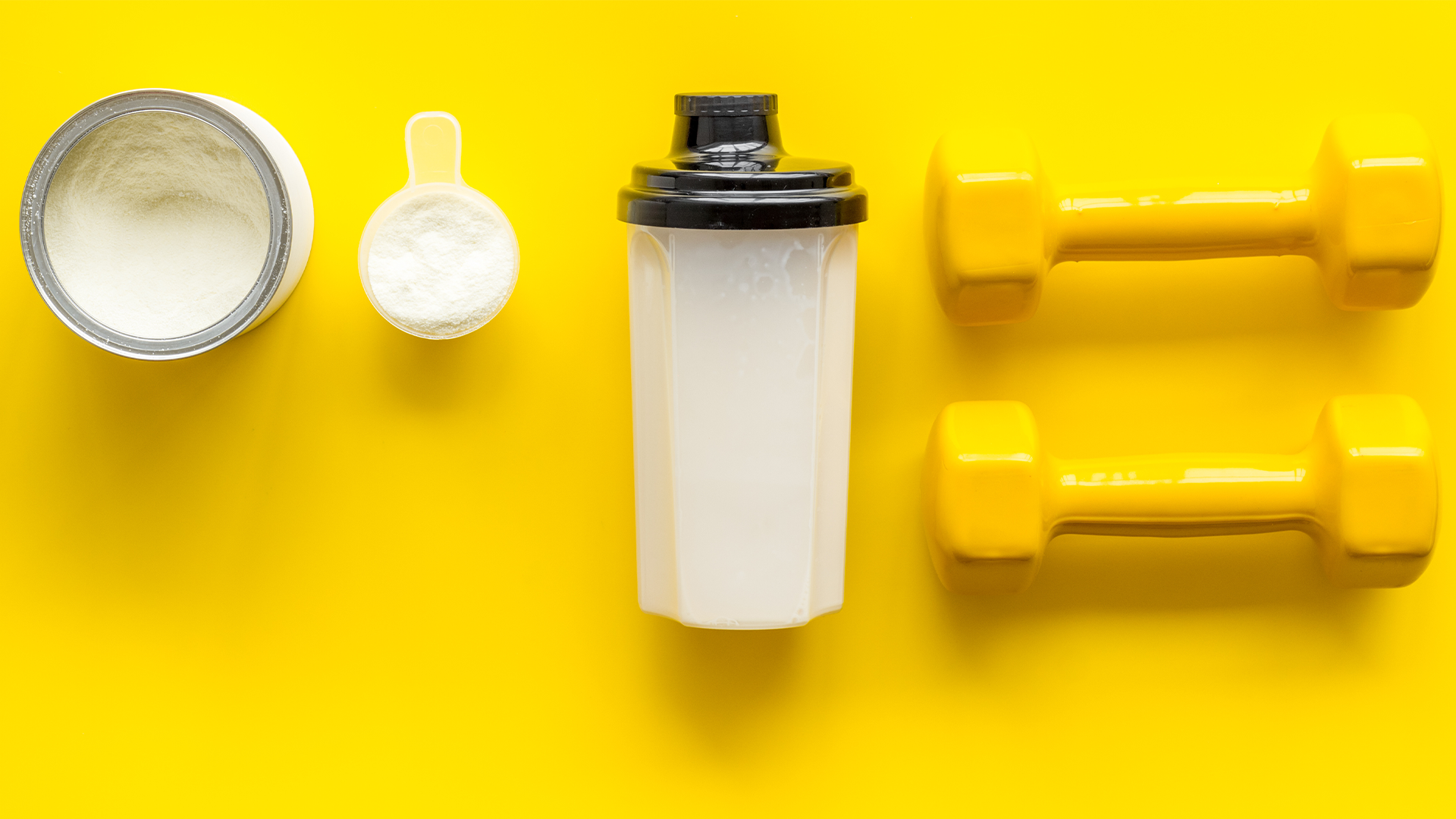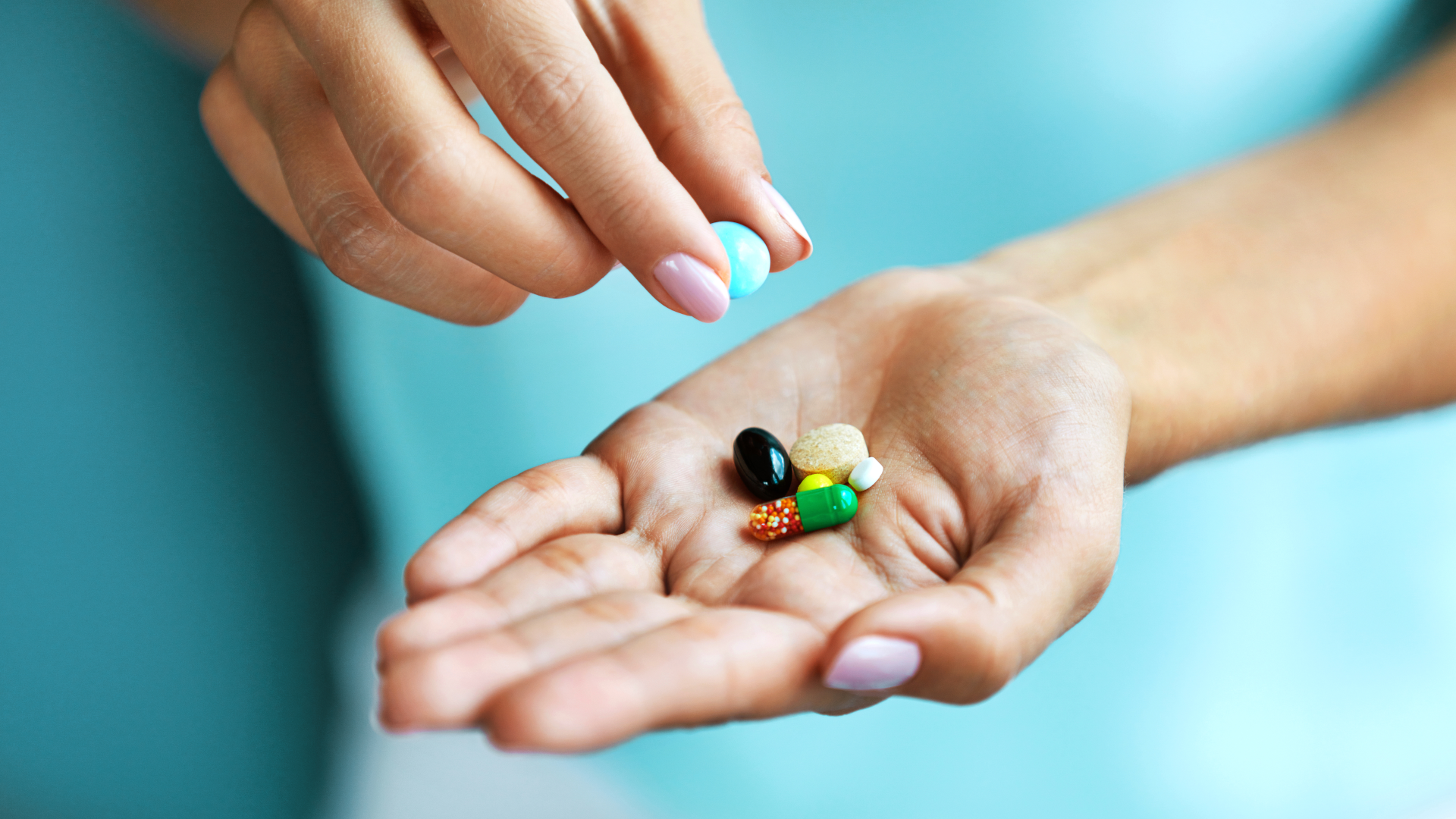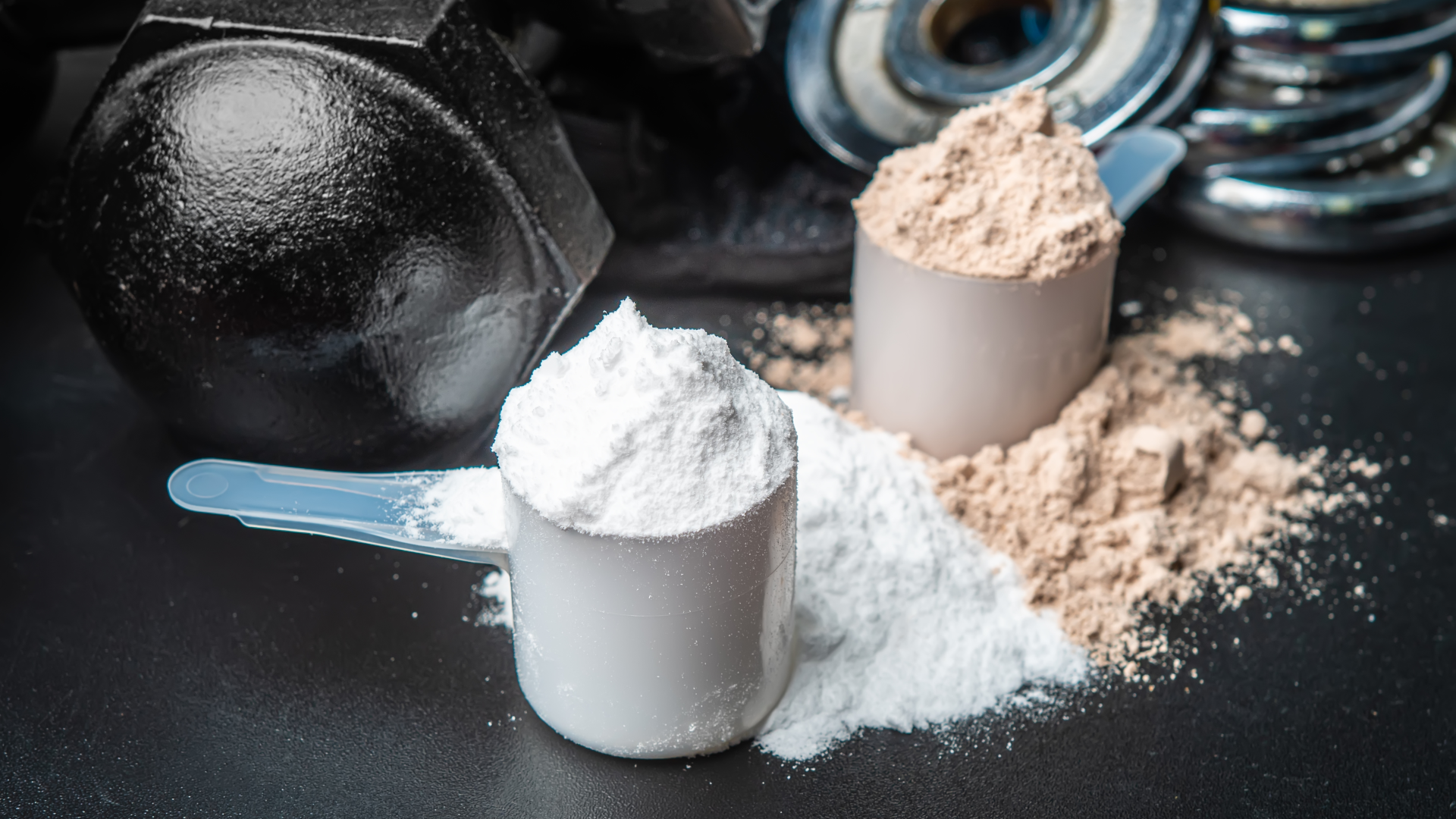Whey protein is a key ingredient in many fitness bars, supplements, and shakes, but what is it, exactly?
This powerful supplement is used by everyone from elite athletes to regular gym goers, and for good reason.
Here, we'll explore the ins and outs of whey protein. We’ll look at what it is, how it's made, the body-boosting benefits, and any potential drawbacks.
Whether you're looking to build muscle, enhance your post-workout recovery, or simply supplement your diet with more protein, whey protein could be a game-changer.
Read on to discover everything you need to know about this popular supplement and whether it could work for you.
What is whey protein, exactly?
Whey protein can be defined as a high-quality protein derived from milk during the cheese-making process.
Yes, it’s a byproduct of milk, where the liquid remaining after curds form is separated and processed to create what we know as whey protein powder.
Whey protein is actually pretty special because it is a "complete protein." It contains all nine essential amino acids that the human body can’t produce on its own and need to be obtained through diet. Bonus.
What are the different types of whey protein?
There are three different forms of whey protein known as whey protein concentrate, whey protein isolate, and whey protein hydrolysate.

While all three are derived from milk protein and offer similar benefits such as muscle growth and repair, there are some key differences to consider.
Whey Protein Concentrate
Whey protein concentrate has a lower percentage of protein at around 70 to 80% and contains some of the natural fats and carbs found in milk. It may contain lactose.
Whey Protein Isolate
Whey Protein Isolate undergoes further processing to remove most of the fats and carbohydrates, leading to a protein content of 90% or more. It’s usually got less lactose in it, so it is the preferred choice for lactose intolerant individuals.
Whey Protein Hydrolysate
Hydrolyzed whey protein has been broken down into smaller peptides through hydrolysis. These smaller peptides mean that this form of whey protein supplement is absorbed into the body faster, assisting very effectively in post-workout recovery or injury.
Can a vegan take whey protein?
No. As whey protein is derived from milk, it’s not suitable for anyone following a vegan diet.
But, that doesn't mean you can't have alternatives. Plant-based protein powders made from rice, hemp, pea or soy protein are widely available for plant-based eaters and are guaranteed to be free from animal products.
Can a woman take whey protein?
Yes. Ignore anything that says otherwise—women can take whey protein—and they do.
If it's good enough for Tennis powerhouse Serena Williams and Crossfit Games titan Katrin Davidsdottir, whey protein supplementation is good enough for you and your workouts. Go get it.
Is whey protein okay for women?
This is one of the most common questions asked by people interested in starting whey protein supplementation—and the answer is yes, yes, yes.
Whey protein is one of the most popular types of protein powder for men and women. So, don’t be afraid to weave it into your fitness routine.
The benefits of whey protein for women
We already know that it’s a high-quality protein powerhouse and packed with essential vitamins and nutrients. But, what other health benefits does whey powder bring to the table?
Let’s take a look.
Better body composition and improved physical appearance
There's research to suggest that whey protein may aid in muscle growth in women when it’s consumed in conjunction with resistance training. This happens when whey protein stimulates the production of muscle protein synthesis through the activation of mTOR signaling pathways.
Whey protein has a magic ability to support lean muscle growth and maintenance.

It’s brimming with branched chain amino acids such as leucine which plays a vital role in stimulating muscle protein synthesis. With your body fat percentage reduced, your overall body composition will improve in terms of lean muscle mass.
With this improved muscle protein synthesis comes muscle growth, strength, and toning. A body-boosting triple threat.
Plus, research suggests women can benefit from whey protein by reducing the risk of reducing the risk of type 2 diabetes and cardiovascular disease.
It's highly digestible
Most people find whey protein really easily digestible and that it doesn't upset their digestive tract.
When you’re working out, the last thing you want to deal with is a bad stomach. And, consuming whey is unlikely to cause you any digestive issues.
Better recovery and reduced muscle soreness after exercise
Research shows a correlation between whey protein and better recovery after exercise. In one study, when measured against a control treatment, whey protein was found to contribute to the recovery of muscle function.
This means those who use whey protein supplementation could get back in the gym sooner and feeling fresher than if they didn't take it.

As whey protein has a really rapid absorption rate, it allows for some fast delivery of its amino acids to the muscles—cue an extra speedy recovery process.
Whey protein and weight loss
You might be asking if whey protein is good for women's weight loss.
The truth is that it is an excellent supplement to take if you want to lose weight.
Here's why.
With the consumption of whey protein comes an increase in satiety and a reduction in appetite. The result? A reduction in calories consumed.
Less desire to eat equals being less prone to snacking and overeating.
Due to these increased levels of seity hormones, the brain receives signals that it is full. And, being fuller for longer means whey protein is good for a woman's weight loss and long term weight loss goals.
Whey protein and (intentional) weight gain
Not all women who are interested in learning about whey protein want to lose weight.
When added to a balanced diet (meal prepping helps) and combined with an exercise routine, whey protein supplements or powders can help you with your weight gain goals.
By giving the body additional protein, whey protein benefits the development of muscle mass. As we know, muscle weighs more than fat so the scales will most likely show the results before the mirror.
Potential disadvantages or negatives
There seem to be plenty of good points about whey powder, but is whey protein bad for women too?
Let's explore.
Is whey protein bad for women?
No, it’s not bad for women.
There’s, in fact, no difference between men or women’s side effects after consuming whey protein.
But it’s important to note that the response of your body to whey protein can vary based on individual factors, like pre-existing conditions or allergies.
Stomach discomfort
Whey protein is generally well-tolerated by those that take it with an emphasis placed on how well it is digested and absorbed into the body.
But, some people do have some side effects after taking it. Having high doses of whey protein can cause stomach cramps and pains. So, try not to overdo it.
Digestive Issues
As whey protein is a dairy product may contain lactose which can cause digestive problems for lactose intolerant people. Symptoms include bloating, gas, and diarrhea.
Allergies
Whey protein is derived from milk and for those who are allergic to it can present in skin rashes and digestive issues.
Kidney and Liver Function
There has been a link between the negative impact of whey protein and kidney and liver function in some studies.

That said, this is in extreme cases where very high and prolonged use of whey protein has resulted in excessive amounts of protein.
Weight protein for elderly women
Did you know? Whey protein intake is an area of consideration for elderly women in order to promote their well-being and overall health?
There’s nutritional research to suggest that most older adults—women included—need to consume 1-1.2 grams of protein per kilogram of bodyweight.
This level of protein is needed for elderly women to help preserve muscle function and mass as they age.
Pregnancy and whey protein
If you’re pregnant or thinking about getting pregnant, you’ll want to know whether whey protein is safe to take.
Can a pregnant woman drink whey protein shakes?
Yes, but in limited amounts. And, you’ll need to carefully consider which protein shake you use as to whether it has any added substances that may be harmful to the fetus.
Definitely discuss this topic with your healthcare provider first for up-to-date information relative to your personal situation.
How much whey protein should a woman take a day
How much protein does a woman need in a day? And is there such a thing as too much protein?
The recommended daily intake will vary depending on your muscle mass, body weight, activity level, and how much protein you get from your general diet.

FYI: A typical recommendation for whey protein supplementation is to have around 0.8 grams of protein per kilo of body weight, per day. That’s equal to around 10% to 35% of your total calories in a day.
This total is for an average person to meet their general health needs. If you undertake intense strength training or exercise, you’ll need a higher dose of protein.
Can you have too much protein?
Yes, it’s possible to have too much protein, particularly if you aren't consuming much carbohydrate in your diet.
When you consume too much protein, you can put pressure on the liver and kidney. It can also increase the risk of heart disease.
According to the American Heart Association, a diet with a higher percentage of calories from protein may be harmful to the heart, in turn leading to heart disease.
So, a varied and balanced diet with plenty of water is advised to stay on the right track.
Weaving whey protein into your workout routine
Now you know all about the benefits of whey powder, let's discuss how to weave it into your workout routine.
How to take whey protein
When it comes to taking whey protein, there are a few options to explore.
Whey Protein Shakes
Shakes are a popular way to consume this type of protein. It's done by mixing the recommended serving size of powder with your choice of liquid, like cow milk, plant milk, and water. Just shake and go.
Some people also like to add extras like nut butter or fruits for that extra nutritional punch.
Smoothies
Add whey protein to your smoothie for an extra protein boost. Blending in your powder to your usual smoothies can be a tasty way to take it without any extra effort on your part.

Mixing with Food
If you enjoy things like muffins, pancakes, yogurt or oatmeal, consider adding some protein powder to these recipes too. Easy.
When to take whey protein
It really comes down to a question of timing.
When is it best to get the full benefits of whey protein, pre or post-workout?
As whey protein is used to aid and support the recovery process and growth of muscles, there are arguments for it to be consumed either before or after workouts.
Pre-workout
While research suggests it may not make a significant difference whether you have it before or after, one argument for taking it before (30 to 60 minutes to be exact) is that it can provide a source of amino acids to fuel your muscles throughout your workout so you feel stronger for longer.
Post-workout
Alternatively, taking it after can help initiate muscle repair and recovery quickly by the amino acids kicking muscle protein synthesis into action, aiding post-workout recovery.

There’s also wide support for consuming whey protein powder periodically throughout the day.
Between meals
Busy people (sound familiar) who may not be hitting all their daily protein goals through diet alone can supplement their intake throughout the day.
Before bedtime
Promoting a slow release of amino acids throughout the night helps muscle protein synthesis during sleep while stopping muscle breakdown.
Ultimately, it's about hitting those protein daily goals rather than the timing and that your individual goals and needs may vary from others.
What is the best whey protein for women
Which whey protein fits you and your workout goals best is down to your personal preferences. So, consider things like your workout routine, dietary requirements, and medical needs such as allergies.
Did you know? Many athletes, bodybuilders and regular gym goers rate Crazy Nutrition's RTI-PROTEIN for its muscle building qualities, metabolism burn, satiation, and epic energy hit.
It comes in salted caramel, apple, and chocolate flavor. And, it’s designed to take periodically throughout the day to help you hit your protein needs.
RTI-PROTEIN is a unique product as it contains six natural, non-GMO proteins including whey protein isolate, whey protein concentrate and calcium caseinate which stagger the absorption rates of the protein into the body.
For a starter powder for women who want to smash their workouts and recovery, why not try this specially-formulated product that fitness experts and strength coaches swear by?



